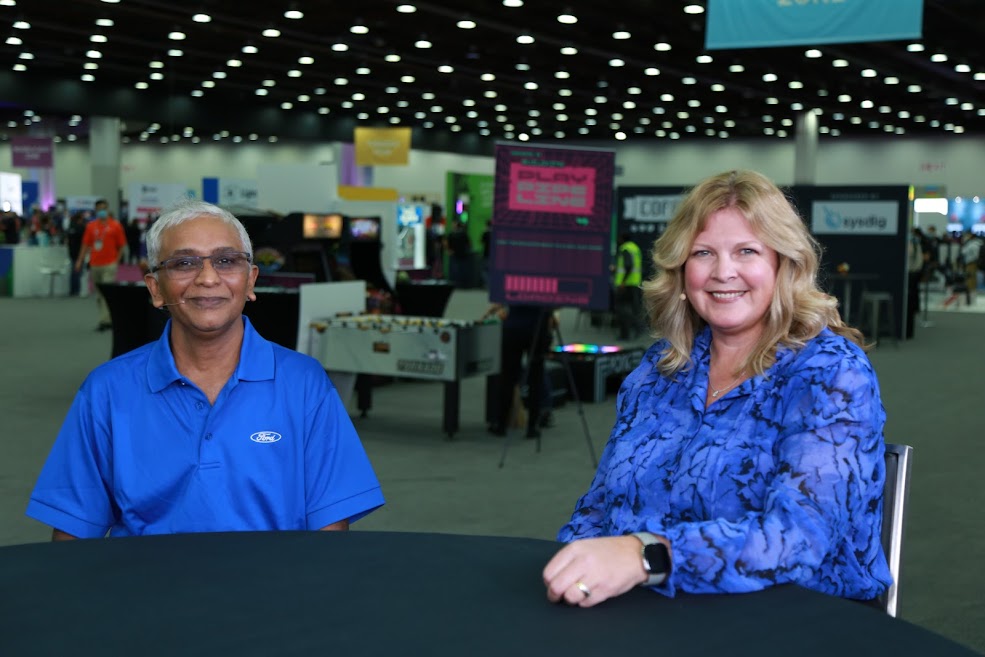 CLOUD
CLOUD
 CLOUD
CLOUD
 CLOUD
CLOUD
Kubernetes 1.0 was released in July 2015. The next year, one of the first major companies to begin using the container platform was Ford Motor Co.
Ford was early to the cloud-native bandwagon long before the majority of enterprises hopped aboard. The automaker had a culture of experimentation, according to one of its engineers, and had been using Cloud Foundry, an open-source, multicloud application platform.
“We started the cloud-native journey in 2016 with Cloud Foundry,” said Satish Puranam (pictured, left), senior security and controls engineer at Ford. “Kubernetes was bursting on the scene at that time, so we started doing a lot of experimentation. We were crazy enough to do stateful on Kubernetes, and we’ve been doing it successfully so far for five years.”
Puranam spoke with theCUBE industry analysts Lisa Martin and Savannah Peterson at KubeCon + CloudNativeCon NA 2022, during an exclusive broadcast on theCUBE, SiliconANGLE Media’s livestreaming studio. He was joined by Rebecca Riss (pictured, right), principal enterprise architect and career mentor at Ford, and they discussed how tech adoption has impacted the company’s developer culture and business strategy.
Ford’s early adoption of cloud-native and Kubernetes has allowed it to make the strategic adjustments necessary to remain a force in the highly competitive automotive industry. Since 2016, the company acquired the startup mobility service Chariot for $50 million, retooled its manufacturing lines with a host of new technologies, and pivoted toward production of electric vehicles.
This has also transformed the company culture and fostered increased responsibilities for the firm’s developers, a process in which Riss has played a central role.
“We have development programs that allow you to upscale, change your role, learn new things and play with new technologies,” she said. “Ford continues to invest in our culture transformation, because with each step we do we have to refine what our priorities are. That’s been the key to our successful pivots that we’ve made over the last six years.”
Ford has also pursued a strategy to leverage the power of the community and drive transformation from traditional software development to cloud-native creation. The automaker has used Kube By Example, in partnership with Red Hat Inc. and Boston University, to upskill its workforce.
“Kubernetes is great, and it’s also a wall of YAML,” said Puranam, in reference to the Kubernetes codebase that can be complex to use. “We’re trying to lower the bar so more people can participate in it. That has been inspirational in terms of reinforcing the learning, and that has been where we started working with Boston University and Red Hat.”
Here’s the complete video interview, part of SiliconANGLE’s and theCUBE’s coverage of the KubeCon + CloudNativeCon NA 2022 event:
Support our mission to keep content open and free by engaging with theCUBE community. Join theCUBE’s Alumni Trust Network, where technology leaders connect, share intelligence and create opportunities.
Founded by tech visionaries John Furrier and Dave Vellante, SiliconANGLE Media has built a dynamic ecosystem of industry-leading digital media brands that reach 15+ million elite tech professionals. Our new proprietary theCUBE AI Video Cloud is breaking ground in audience interaction, leveraging theCUBEai.com neural network to help technology companies make data-driven decisions and stay at the forefront of industry conversations.